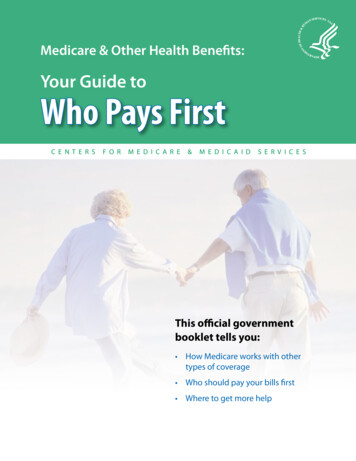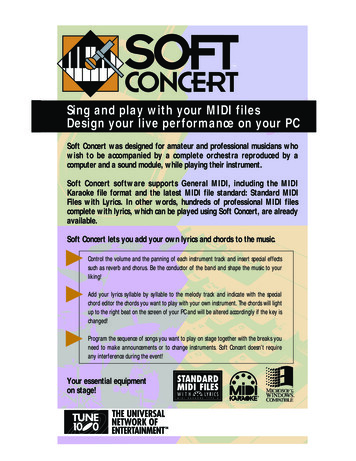
Transcription
Medicare & Other Health Benefits:Your Guide toWho Pays FirstC E NT E R SF O RM E D I C A R E&M E D I C A I DS E RV I C E SThis official governmentbooklet tells you: How Medicare works with othertypes of coverage Who should pay your bills first Where to get more help
The information in this booklet describes theMedicare Program at the time this booklet wasprinted. Changes may occur after printing.Visit Medicare.gov, or call 1-800-MEDICARE toget the most current information.“Medicare & Other Health Benefits: Your Guideto Who Pays First” isn’t a legal document.Official Medicare Program legal guidance iscontained in the relevant statutes, regulations,and rulings.
3Table of contentsSection 1: When you have other health coverage . . . . . . . . . . . . . . . . . . . . . 5Coordination of benefits . . . . . . . . . . . . . . . . . . . . . . . . . . . . . . . . . . . . . . . . . . . . . 5Where to go with questions . . . . . . . . . . . . . . . . . . . . . . . . . . . . . . . . . . . . . . . . . . . 5How Medicare works with other coverage–find your situation . . . . . . . . . . . . . 6How will Medicare know I have other coverage? . . . . . . . . . . . . . . . . . . . . . . . . . 9What happens if my health coverage changes? . . . . . . . . . . . . . . . . . . . . . . . . . . . 9What if I have Medicare and more than one type of coverage? . . . . . . . . . . . . . 9Can I get coverage through the Health Insurance Marketplace if Ialready have Medicare? . . . . . . . . . . . . . . . . . . . . . . . . . . . . . . . . . . . . . . . . . . . . 10Section 2: Medicare & other types of health coverage . . . . . . . . . . . . . . . . . 11Medicare & Medicaid . . . . . . . . . . . . . . . . . . . . . . . . . . . . . . . . . . . . . . . . . . . . . . . 11Medicare & group health plan coverage when you’re still working . . . . . . . . . 11Medicare & group health plan coverage after you retire . . . . . . . . . . . . . . . . . . 14Medicare & Medigap . . . . . . . . . . . . . . . . . . . . . . . . . . . . . . . . . . . . . . . . . . . . . . . 17Medicare & group health plan coverage for people who are disabled(non-ESRD disability) . . . . . . . . . . . . . . . . . . . . . . . . . . . . . . . . . . . . . . . . . . . . . 18Medicare & group health plan coverage for people with End‑StageRenal Disease (ESRD) . . . . . . . . . . . . . . . . . . . . . . . . . . . . . . . . . . . . . . . . . . . . 19Medicare & Indian Health Services (IHS) . . . . . . . . . . . . . . . . . . . . . . . . . . . . . 19Medicare & no-fault or liability insurance . . . . . . . . . . . . . . . . . . . . . . . . . . . . . 19Medicare & workers’ compensation . . . . . . . . . . . . . . . . . . . . . . . . . . . . . . . . . . . 22Medicare & Veterans’ benefits . . . . . . . . . . . . . . . . . . . . . . . . . . . . . . . . . . . . . . . . 26Medicare & TRICARE . . . . . . . . . . . . . . . . . . . . . . . . . . . . . . . . . . . . . . . . . . . . . . 27Medicare & the Federal Black Lung Benefits Program . . . . . . . . . . . . . . . . . . . 28Medicare & COBRA . . . . . . . . . . . . . . . . . . . . . . . . . . . . . . . . . . . . . . . . . . . . . . . . 28
4Notes
5SECTION1When you have otherhealth coverageCoordination of benefitsIf you have Medicare and other health coverage, you may have questionsabout how Medicare works with your other insurance and who pays yourbills first. Each type of coverage is called a “payer.” When there’s morethan one payer, “coordination of benefits” rules decide who pays first. The“primary payer” pays what it owes on your bills first, then you or your healthcare provider sends the rest to the “secondary payer” (supplemental payer)to pay. In some rare cases, there may also be a “third payer.”Whether Medicare pays first depends on a number of things, including thesituations listed in the chart on the next 3 pages. However, this chart doesn’tcover every situation. Be sure to tell your doctor and other providers if youhave health coverage in addition to Medicare. This will help them send yourbills to the correct payer to avoid delays.Where to go with questionsIf you have questions about who pays first, or if your coveragechanges, call the Benefits Coordination & Recovery Center (BCRC) tollfree at 1-855-798-2627. TTY users can call 1-855‑797‑2627.The BCRC is the contractor that acts on behalf of Medicare to collect andmanage information on other types of insurance or coverage that a personwith Medicare may have, and determines whether the coverage pays beforeor after Medicare. This contractor also acts on behalf of Medicare to getrepayment when Medicare makes a conditional payment, and another payeris determined to be primary.When you call the BCRC, have your Medicare Number ready—you can findit on your red, white, and blue Medicare card. The BCRC may also ask forinformation like your Social Security Number (SSN), your address, the dateyou were first eligible for Medicare, and whether you have Medicare Part A(Hospital Insurance) and/or Medicare Part B (Medical Insurance).
6Section 1: When you have other health coverageHow Medicare works with other coverage–find your situationFind your situation on pages 6 through 8 to see which payer generally pays first forMedicare-covered items and services, and which page to visit for more details.You can also get this information by visiting Medicare.gov.I’ve got Medicaid (page 11)Medicare pays first, and Medicaid pays second.I’m 65 or older and have group health plan coverage based on my owncurrent employment status or the current employment status of my spouse(pages 11–13). If the employer has 20 or more employees, then the group health plan pays first,and Medicare pays second. If the employer has less than 20 employees and isn’t part of a multi-employer ormultiple employer group health plan (see page 18), then Medicare pays first, andthe group health plan pays second. See page 13.I’m in a Health Maintenance Organization (HMO) Plan or Preferred ProviderOrganization (PPO) Plan through my employer and get services outside theemployer plan’s network (page 16)It’s possible that neither the plan nor Medicare will pay if you get care outside youremployer plan’s network. Before you go outside the network, call your group healthplan to find out if it will cover the service.I’m 65 or older, retired, and have group health plan coverage from my spouse’scurrent employer (page 16)If your spouse’s employer has 20 or more employees, your spouse’s plan pays first andMedicare pays second.I’m under 65, disabled, retired, and have group health plan coverage from myformer employer (page 16)Medicare pays first and your group health plan (retiree) coverage pays second.I’m under 65, disabled, retired and have group health plan coverage based onmy family member’s current employer (page 18) If the employer has 100 or more employees, then the large group health plan paysfirst, and Medicare pays second. See page 13.
Section 1: When you have other health coverage7How Medicare works with other coverage—find your situation(continued)I’m under 65, disabled, retired and have group health plan coverage basedon my family member’s current employer (page 18) (continued) If the employer has less than 100 employees, and isn’t part of a multi-employer ormultiple employer group health plan (see page 18), then Medicare pays first, andthe group health plan pays second. If the employer is part of a multi-employeror multiple employer group health plan, the group health plan pays first andMedicare pays second.I have Medicare due to End-Stage Renal Disease (ESRD), and group healthplan coverage (including a retirement plan) (page 19)When you’re eligible for or entitled to Medicare due to ESRD, during acoordination period of up to 30 months, the group health plan pays first andMedicare pays second. After the coordination period, Medicare pays first and thegroup health plan pays second. If you originally got Medicare due to your age ora disability other than ESRD, and your group health plan was your primary payer,then it still pays first when you become eligible because of ESRD.I have group health plan coverage, I first got Medicare due to turning 65 orbecause of a disability (other than ESRD), and now I have ESRD. Who paysfirst? (Page 19)Whichever coverage paid first due to your age or non-ESRD disability still paysfirst when you become eligible for Medicare because of ESRD: If you originally got Medicare due to your age or a disability (other than ESRD)and Medicare paid first, then Medicare continues to pay first even when youbecome eligible for Medicare because of ESRD. If you originally got Medicare due to your age or a disability (other than ESRD)and your group health plan paid first, then it still continues to pay first when youbecome eligible because of ESRD.I have Medicare due to End-Stage Renal Disease (ESRD), and COBRA coverage(page 29)When you’re eligible for or entitled to Medicare due to ESRD, during acoordination period of up to 30 months, COBRA pays first. Medicare pays second,to the extent COBRA coverage overlaps the first 30 months of Medicare eligibilityor entitlement based on ESRD.
8Section 1: When you have other health coverageHow Medicare works with other coverage—find your situation(continued)I get health services from the Indian Health Services (IHS) or an IHS provider(page 19) If you have group health plan coverage through an employer who has 20 or moreemployees, the group health plan pays first, and Medicare pays second. If you have group health plan coverage through an employer who has less than 20employees, Medicare pays first, and the group health plan pays second. If you have a group health plan through tribal self-insurance, Medicare pays firstand the group health plan pays second.I’ve been in an accident where no-fault or liability insurance is involved(pages 19–21)No-fault insurance or liability insurance pays first and Medicare pays second forservices related to the accident or injury.I’m covered under workers’ compensation because of a job related illness orinjury involved (pages 22–25)Workers’ compensation pays first for services or items related to the workers’compensation claim. Medicare may make a conditional (a payment that must berepaid to Medicare when a settlement, judgment, award, or other payment is made).I’m a Veteran and have Veterans’ benefits (page 26)Generally, Medicare and VA can’t pay for the same service or items. Medicare pays forMedicare-covered services or items. Veterans’ Affairs pays for VA-authorized servicesor items.I’m covered under TRICARE (page 27) For active-duty military enrolled in Medicare, TRICARE pays first for Medicarecovered services or items, and Medicare pays second. For inactive-duty military enrolled in Medicare, Medicare pays first and TRICAREmay pay second. TRICARE pays first for services or items from a military hospital or any otherfederal provider. For active-duty military enrolled in Medicare, TRICARE pays first for Medicarecovered services or items, and Medicare pays second.
Section 1: When you have other health coverage9How Medicare works with other coverage—find your situation(continued)I’m covered under TRICARE (page 27) (continued) For inactive-duty military enrolled in Medicare, Medicare pays first andTRICARE may pay second. TRICARE pays first for services or items from a military hospital or any otherfederal provider.I have black lung disease and I’m covered under the Federal Black LungBenefits Program (page 28)The Federal Black Lung Benefits Program pays for services related to black lung.Medicare pays first for all other health care not related to black lung disease.I have COBRA continuation coverage (page 29) If you have Medicare because you’re 65 or over or because you have a disabilityother than End-Stage Renal Disease (ESRD), Medicare pays first. If you have Medicare based on ESRD, COBRA pays first. Medicare pays secondto the extent COBRA coverage overlaps the first 30 months of Medicareeligibility or entitlement based on ESRD.How will Medicare know I have other coverage?Medicare doesn’t automatically know if you have other coverage. However, insurersmust report to Medicare when they’re responsible for paying first on your medicalclaims. A claim is a request for payment that you submit to Medicare or other healthinsurance when you get items and services that you think are covered. In some casesyour health care provider, employer, or your insurer may ask you questions aboutyour current coverage so they can report that information to Medicare.You can also report your coverage information by calling the BenefitsCoordination & Recovery Center (BCRC) toll-free at 1-855-798-2627.TTY users can call 1-855-797-2627.Example: Harry recently turned 65 and is eligible to enroll in Medicare.He works for a company with 20 or more employees, and has coverage through hisemployer’s group health plan. Since Harry is still currently working, the insurerwill report Harry’s group health plan insurance information to Medicare so thatMedicare knows to pay Harry’s claims second.
10Section 1: When you have other health coverageWhat happens if my health coverage changes?Insurers must report these changes to Medicare, but the changes can take sometime to be posted to Medicare’s records.If that happens, call the Benefits Coordination & Recovery Center (BCRC) tollfree at 1-855‑798‑2627. TTY users can call 1-855-797-2627. You’ll have to givethis information: Your name The name and address of your health plan Your policy number The date coverage was added, changed, or stopped, and whyTell your doctor and other health care providers about changes in your coveragewhen you get care. Also, contact your health plan to make sure they reportedthese changes to Medicare. Medicare uses your answers to help keep your filecorrect so your claims get paid correctly.What if I have Medicare and more than one type ofcoverage?Check your insurance policy—it may include the rules about who pays first.You can also call the BCRC.Can I get coverage through the Health InsuranceMarketplace if I already have Medicare?Generally, no. It’s against the law for someone who knows that you haveMedicare to sell or issue you a Marketplace policy. This is true even if you haveonly Medicare Part A or only Medicare Part B. Therefore, if you already haveMedicare, you shouldn’t need to coordinate benefits between Medicare and aMarketplace plan.On the other hand, if you don’t yet have Medicare but have coverage throughthe Marketplace, you can choose to keep your Marketplace plan after yourMedicare coverage starts. But once your Medicare Part A coverage starts andyou’ve been getting premium tax credits or other savings on a Marketplace plan,these savings will end. If you keep your Marketplace plan, you would have topay full price. For this reason, in most cases you’ll want to end your Marketplacecoverage once you’re eligible for Medicare. If you age into Medicare and decideto keep your Marketplace plan, then Medicare pays first.
11SECTION2Medicare & other typesof health coverageThe situations on pages 6–8 can help you find your type(s) of coverage andsituation to see which payer pays first.This section provides detailed information on how Medicare works withyour other health coverage.Medicare & MedicaidMedicaid is a joint federal and state program that helps pay medical costsfor certain people and families who have limited income and resources andmeet other requirements. Medicaid programs vary from state to state, butmost health care costs are covered if you qualify for both Medicare andMedicaid. Medicaid never pays first for services covered by Medicare.It only pays after Medicare has paid. In rare cases where there’s othercoverage, Medicaid pays after the other coverage has paid.Medicare & group health plan coverage when you’restill workingMany employers, employee organizations and unions offer group health plancoverage to current employees or retirees. In general, a group health plangives health coverage to employees and their families. If you have FederalEmployees Health Benefits (FEHB) Program coverage, your coverage worksthe same as it does for all group health plans. You may also get group healthplan coverage through the employer of a spouse or family member.If you have Medicare and you’re offered coverage under a group health plan,you can choose to accept or reject the plan. The group health plan may be afee-for-service plan or a managed care plan, like an HMO or PPO.
12Section 2: Medicare & other types of health coverageMedicare & group health plan coverage (continued)I’m 65 or older and have group health plan coverage based on my own currentemployment status or the current employment status of my spouse and theemployer has 20 or more employees.If your or your spouse’s employer has 20 or more employees, the group health planpays first and Medicare pays second.Generally, your group health plan pays first if both of these are true:1. You’re 65 or older and covered by a group health plan through your currentemployer or the current employer of a spouse of any age.Note: For this situation, “spouse” includes both opposite-sex and same-sexmarriages where 1) you’re entitled to Medicare as a spouse based on SocialSecurity’s rules; and 2) the marriage was legally entered into in a U. S. jurisdictionthat recognizes the marriage—including one of the 50 states, the District ofColumbia, or a U.S. territory—or a foreign country, so long as that marriage wouldalso be recognized by a U.S. jurisdiction.An employer, insurer, third party administrator, group health plan, or other plansponsor may choose to have a more inclusive definition of spouse than describedabove. Under these circumstances, the plan may pay, but isn’t required to pay, first forsomeone it considers a spouse under its definition. Contact your employer or insurerif you have a question about their definition of “spouse” and how claims will be paid.2. The employer has 20 or more employees and covers any of the same servicesas Medicare (this means the group health plan pays first on your hospital andmedical bills).If the group health plan didn’t pay all of your bill, the doctor or health care providershould send the bill to Medicare for secondary payment. Medicare may pay on whatthe group health plan paid, what the group health plan allowed, and what the doctor orhealth care provider charged on the claim. You may have to pay any costs Medicare orthe group health plan doesn’t cover.Employers with 20 or more employees must offer current employees age 65 and olderthe same health benefits under the same conditions that they offer employees under 65.If the employer offers coverage to spouses, it must offer the same coverage to spouses 65and older that it offers to spouses under 65.
Section 2: Medicare & other types of health coverage13Medicare & group health plan coverage (continued)I’m 65 or older and have group health plan coverage based on my owncurrent employment status or the current employment status of my spouseand the employer has less than 20 employees.Medicare pays first. Medicare may pay second if both of these apply: Your employer, which has less than 20 employees, joins with other employers oremployee organizations (like unions
Medicare may make a conditional (a payment that must be repaid to Medicare when a settlement, judgment, award, or other payment is made) . I’m a Veteran and have Veterans’ benefits (page 26) Generally, Medicare and VA can’t pay for the s











